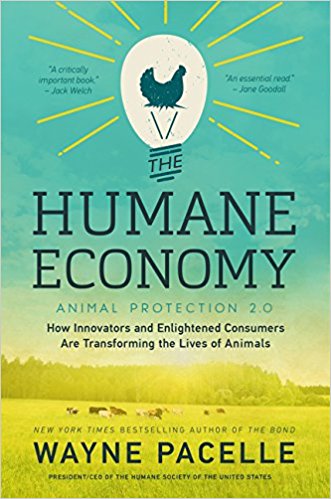After a string of battle victories for animal rights with Walmart, McDonald’s, Ringling Brothers, Armani and finally SeaWorld, the head of the Humane Society of the United States is looking to win the global war with those engaged in the animal economy.
“Just about every enterprise built on harming animals today is ripe for disruption,” writes Wayne Pacelle in his new book about the battle, The Humane Economy: How Innovators and Enlightened Consumers Are Transforming the Lives of Animals.

The book, which goes on sale Tuesday, details Pacelle’s teamwork with billionaire Carl Icahn and others to convince some of the biggest companies in the world to change practices and purchases so that they become more animal friendly.
The shift parallels somewhat the nation’s embrace of other compassion issues. In fact, Pacelle compared it with the nation’s slow acceptance of the LGBT movement.
“Values are changing in society,” the HSUS CEO said in a radio interview with Bill Press Monday. Like gay rights, animal rights “is not an idea on the margins” anymore.
Constantly under fire from critics including Humane Watch, who want HSUS to spend more on locally-funded animal shelters, Pacelle’s book is the fullest explanation yet of its job of as the nation’s lobbyist for animals, pushing against cages for chickens and cows, arguing against using fur in fashion or animals for chemical and cosmetic testing, and even encouraging the federal government to restore threatened animal populations.
A take away from the book is that instead of attacking targets, HSUS and its allies have shown that changing policies can be good for the bottom line and public image.
“When it comes to the humane economy, making money and doing good is precisely the point. If ideas about compassion are going to prevail, they must triumph in the marketplace,” wrote Pacelle.
That clearly was the case with SeaWorld, which has decided to stop breeding orcas and on Monday even paid for ads with HSUS calling for the end of commercial whaling.
It has also created some unexpected friendships, like the support from Donald Trump’s top border state official, Maricopa County, Ariz., Sheriff Joe Arpaio, who cut an ad that said while he loved pork chops, “what they do to these pigs in gestation crates is cruel.” Pacelle wrote the sheriff has since become a vegetarian and serves his inmates vegetarian meals. And he’s even promoted his animal “soft spot” in campaign ads.
Along the way, he notes, the food industry has gone high tech, and several companies are using plant-based products to make items that taste and have the same mouth texture as meat.
Multiple successes in hand, Pacelle said the battle is still beginning. “We are in the midst—much closer to the beginning than to the end, I believe—of an epic political, cultural, and economic realignment in the treatment of animals. Doing something about a moral problem requires first identifying it and then intentionally breaking old habits and conventions,” he wrote.
At the end of the book, he presents a to-do list of sorts:
-
Vote with your dollars. Every time you enter the marketplace, you vote for or against cruelty with your dollars.
-
Eat more plant-based foods.
-
Join and support the HSUS and other groups that help animals.
-
Urge candidates to endorse more pro-animal platforms.
-
Urge lawmakers to enforce animal cruelty laws.
-
Minimize and eliminate food waste.
-
Promote animal rights on social media.
-
Ask corporate execs to be more animal-conscious.
-
Travel as an eco-tourist.
- “Live as if all life matters.”
Paul Bedard, the Washington Examiner’s “Washington Secrets” columnist, can be contacted at [email protected]

